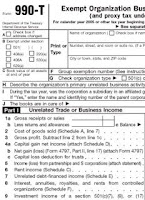By Derek Link, Non-Profit Consultant
The IRS requires that certain federally tax-exempt organizations file an IRS Form 990 as an annual mechanism for reporting income and expenses as well as other useful information. The 990 form provides information on the filing organization’s mission, officers, Board members, programs, and finances including assets, expenses, income, and grants.
All of this information can be useful to non-profit organizations looking for grant makers likely to make a grant to support their cause. The 990 gives information that is especially revealing for the purposes of grant research. A list of grants is included for that year. This information usually includes:
1. Recipient Agency Name
2. Grant Amounts
3. Agency Address
4. General purpose of the grant
I recommend using the 990 to gather the following information about the grant maker:
- The range of grants that the agency made that year.
- The number of agencies that are similar to yours that received grants and the amounts and purposes of those grants.
- The geographic locations where the agencies were that received funding.
- The specific purposes of the grants. Were any of them for the same purpose for which you are seeking a grant?
If the 990 information for the previous year appears to make a grant maker a good bet for funding, I recommend going back one or two more years to review those 990 forms to verify the information.I also recommend looking at the current guidelines and even calling the grant maker (if such calls are allowable) to make certain that the grant you wish to submit will be of interest to the organization.
My last tip is this – if a grant maker indicates that it does not accept unsolicited proposals, look in the 990 form to see who is in charge of the foundation and who sits on their Board of Directors. You may have a contact among those names, or you could know someone who knows someone who would make an approach on your behalf or arrange a meeting. “Six degrees of Separation” can be a useful principle in making contacts that can lead to an invitation to submit a proposal.

